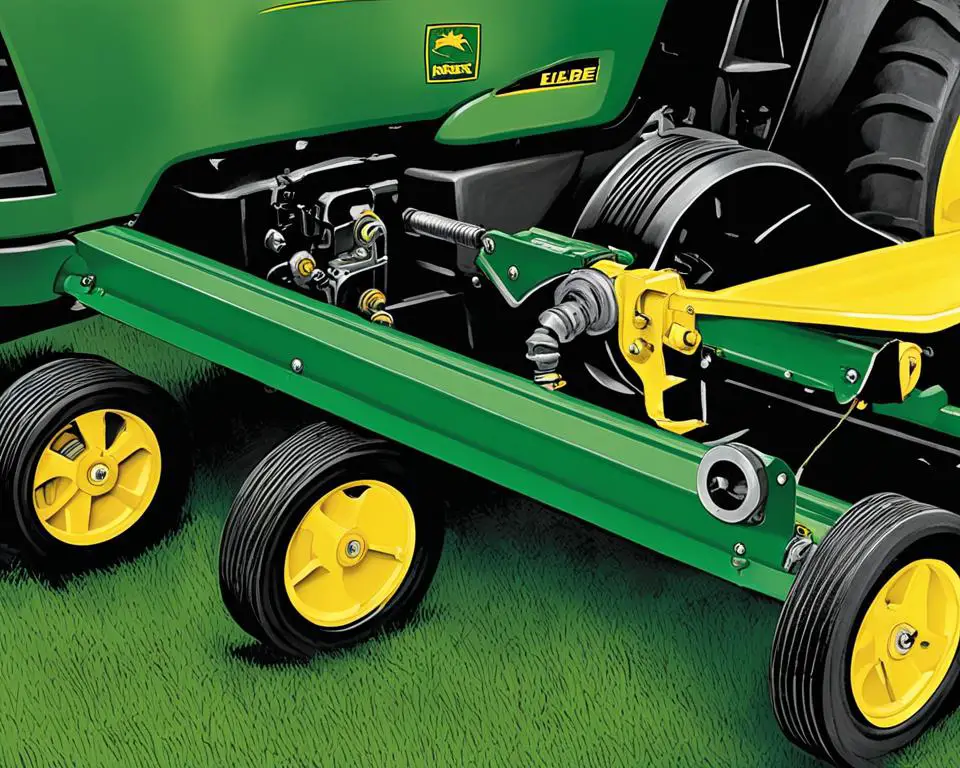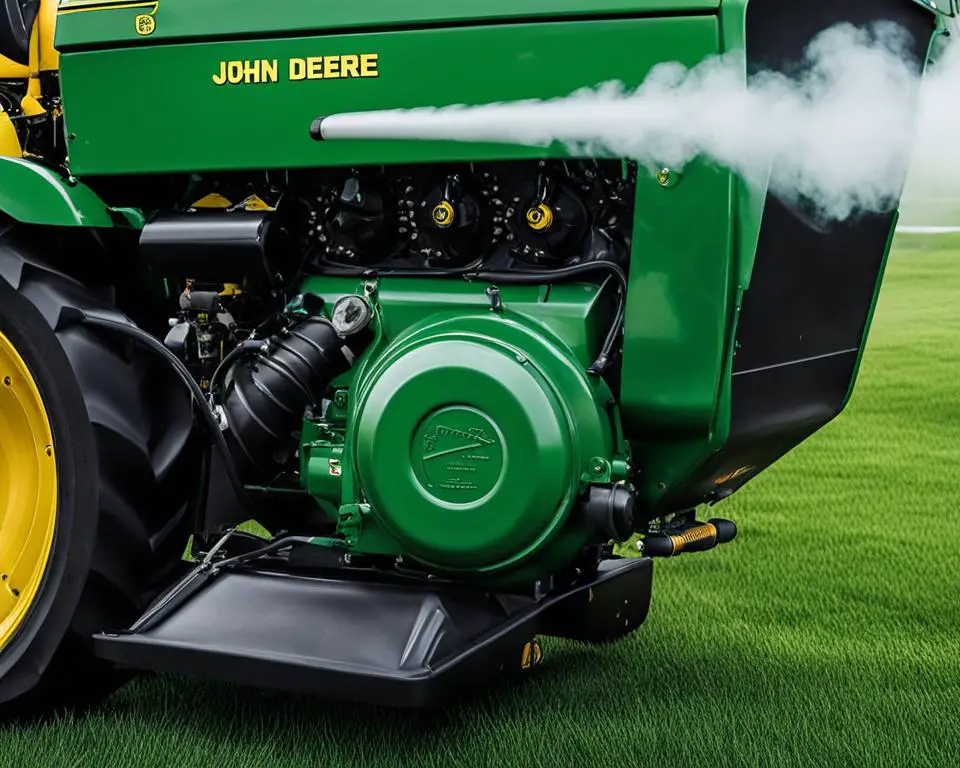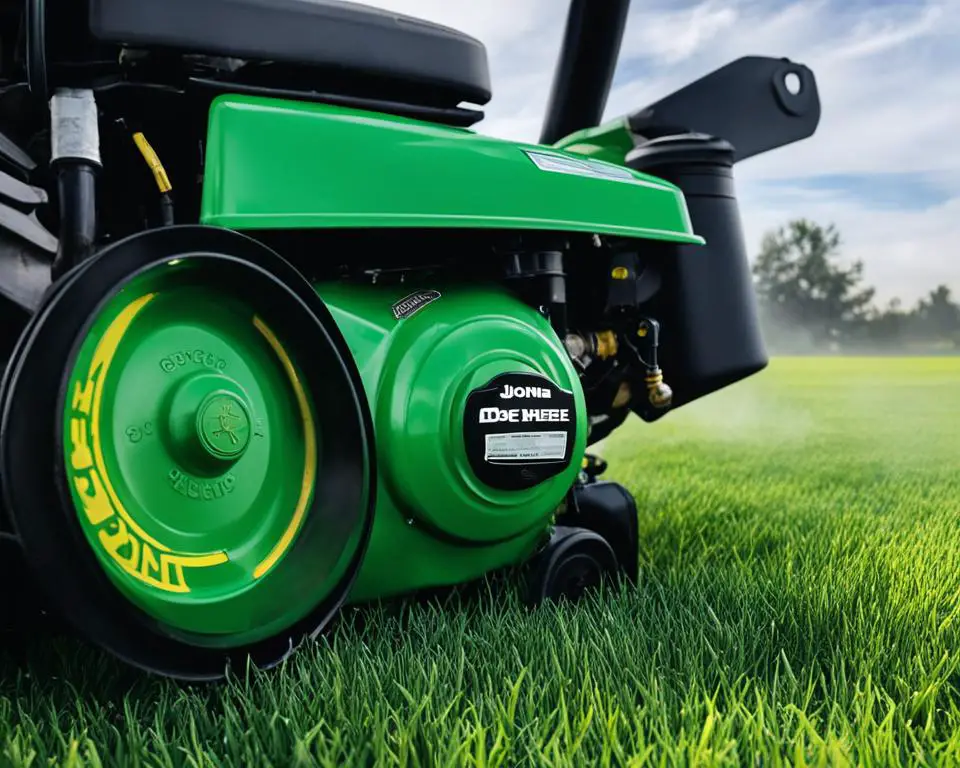Welcome to our comprehensive guide on the common issues and troubleshooting solutions for the John Deere 757 mower. As experienced professionals in the field, we understand the frustration that can arise when encountering problems with your equipment. That’s why we’ve compiled this in-depth analysis of the most frequent problems that owners may face with their John Deere 757 mowers and provided valuable insights on how to resolve them.
From engine-related issues to blade clutch failures, lean running conditions to steering difficulties, we’ve got you covered. Whether you’re a seasoned professional or a first-time owner, this guide will equip you with the knowledge needed to identify and fix these problems efficiently.
Engine Backfiring
Engine backfiring is a notable issue experienced by many John Deere 757 owners. It is characterized by a popping sound and occurs when unburnt fuel ignites in the muffler. The severity of this issue is high and can be attributed to various factors, including the use of lower octane gasoline, carburetor issues, spark plug problems, and fuel line obstructions.
To fix engine backfiring, it is recommended to switch to premium-grade gasoline, perform regular maintenance on the carburetor, spark plugs, and fuel lines, and consult a professional if the problem persists.
“Engine backfiring is a common problem among John Deere 757 owners. The popping sound is a clear indication of unburnt fuel ignition in the muffler.”
One of the main causes of engine backfiring is the usage of lower octane gasoline. The incorrect fuel quality can lead to an improper fuel mixture, resulting in unburnt fuel reaching the muffler where it ignites and causes the popping sound.
Additionally, carburetor issues such as improper adjustments, clogged jets, or worn-out gaskets can contribute to engine backfiring. It is essential to regularly inspect and clean the carburetor to ensure proper fuel and air mixture.
Spark plug problems can also cause engine backfiring. Faulty or worn-out spark plugs may not ignite the fuel-air mixture correctly, leading to unburnt fuel reaching the muffler.
Fuel line obstructions, such as debris or blockages, can disrupt the fuel flow and cause engine backfiring. Regularly inspecting and cleaning the fuel lines can prevent this issue.
Addressing engine backfiring promptly is crucial as it can lead to more significant problems, such as damage to the muffler or exhaust system. Switching to premium-grade gasoline, performing regular maintenance on the carburetor and spark plugs, and checking the fuel lines can help resolve this issue and ensure the smooth operation of the John Deere 757 mower.
Engine Backfiring Troubleshooting Checklist:
- Switch to premium-grade gasoline to ensure proper fuel combustion.
- Inspect and clean the carburetor, checking for any adjustments or worn-out gaskets.
- Regularly inspect and replace faulty spark plugs.
- Check the fuel lines for blockages or obstructions and clean as necessary.
- Consult a professional if the problem persists or worsens.
Failed Blade Clutch
Blade clutch failures are not uncommon in the John Deere 757 mower, especially due to overheating. Overheating can affect critical components such as the crankshaft and the blade clutch itself, leading to issues such as leaks, melted connectors, and reduced performance. This issue has a medium severity level.
A failed blade clutch can significantly impact the overall efficiency and functionality of the John Deere 757 mower,” says Sam Johnson, a John Deere expert. “It’s crucial for owners to address this problem promptly to avoid further damage.”
To fix a failed blade clutch, several steps can be taken:
- Inspect the clutch for wear or damage.
Regular inspections can help identify any signs of wear or damage early on, allowing for timely repairs or replacements. - Ensure proper ventilation to prevent overheating.
Improving airflow around the clutch area can minimize the risk of overheating and subsequent failures. - Check electrical connections for security.
Loose or damaged electrical connections can contribute to clutch failures. Ensuring secure connections can help prevent further issues. - Replace any damaged components, such as hoses or wires.
Any damaged or worn-out components should be promptly replaced to restore the clutch’s proper functionality.
Preventing Blade Clutch Failures
To prevent blade clutch failures and enhance the longevity of your John Deere 757 mower, regular maintenance is key. Here are some preventive measures:
- Clean the mower regularly.
Removing dirt, debris, and grass buildup from the mower blades and clutch area can aid in preventing overheating and subsequent failures. - Inspect and replace worn-out parts.
Periodically check for any signs of wear or damage in the clutch components and replace them as needed. - Follow proper operating procedures.
Adhering to the manufacturer’s guidelines regarding clutch engagement, speed control, and overall usage can help reduce stress on the clutch system.

By addressing failed blade clutch issues promptly and implementing preventive measures, John Deere 757 owners can ensure optimal performance and extend the lifespan of their mowers.
Lean Running Condition
The John Deere 757 mower can sometimes experience a lean running condition, especially in machines that have been in use for a year or two. This issue is characterized by the engine running hotter than usual due to the accumulation of dirt, debris, gum, or varnish. While it has a low severity level, it can have a significant impact on the mower’s performance and longevity.
To address the lean running condition, regular cleaning of the engine and other crucial parts is crucial to prevent dirt accumulation. Additionally, it is essential to inspect and clean the carburetor, checking for any leaks, and maintaining the fuel system. These steps can help improve overall engine performance and ensure the John Deere 757 mower functions optimally.

Common Causes of Lean Running Condition
- Accumulation of dirt, debris, gum, or varnish in the engine
- Clogged or dirty carburetor
- Fuel leaks
- Malfunctioning fuel pump or fuel filter
By actively addressing these potential causes, owners can preserve the engine’s performance and prevent any long-term damage to the John Deere 757 mower.
Effects of Lean Running Condition
Failure to address a lean running condition can lead to several undesirable effects on the engine’s performance and overall functionality of the John Deere 757 mower:
- Increased engine temperature, potentially resulting in engine overheating
- Reduced power output
- Poor fuel efficiency
- Irregular engine idling
- Excessive vibration during operation
To avoid these issues, regular maintenance and cleaning are essential to keep the John Deere 757 mower in optimal condition.
Tips for Prevention and Maintenance
Here are some important tips to prevent a lean running condition and maintain the engine performance of the John Deere 757 mower:
- Regularly clean the engine and surrounding areas to prevent dirt accumulation
- Inspect and clean the carburetor to ensure proper fuel mixture
- Check for any fuel leaks and fix them promptly
- Perform regular maintenance on the fuel pump and fuel filter
Adhering to these preventive measures and implementing proper maintenance practices can significantly improve the engine’s performance, longevity, and overall reliability of the John Deere 757 mower.
Summary
The lean running condition in the John Deere 757 mower can lead to various issues if left unaddressed. By regularly cleaning the engine, inspecting and cleaning the carburetor, checking for leaks, and maintaining the fuel system, owners can prevent the accumulation of dirt and ensure optimal engine performance. Implementing these preventive measures and proper maintenance practices will help keep the John Deere 757 mower running smoothly for years to come.
Steering Difficulties
Are you experiencing steering difficulties with your John Deere 757 mower? Don’t worry, you’re not alone. This common problem can be frustrating, but fortunately, it has a low severity level and can be easily fixed with some simple maintenance.
One possible cause of steering difficulties is low power steering fluid levels. To address this issue, start by checking the power steering fluid level in your John Deere 757. If it’s low, refill it to the recommended level using the appropriate fluid specified in the owner’s manual. This simple step can significantly improve your steering performance.
Another potential culprit for steering difficulties is system leaks. Over time, the hydraulic system in your mower may develop leaks, causing a loss of steering control. It’s important to inspect your John Deere 757 for any signs of fluid leakage. If you notice any leaks, promptly address them by repairing or replacing the affected components. Regular maintenance is essential in preventing system leaks and ensuring smooth steering operation.
By regularly checking the power steering fluid level and addressing any system leaks, you can effectively fix steering difficulties in your John Deere 757 mower. Remember, proactive maintenance is key to keeping your mower running smoothly and efficiently.
FAQ
What are some common problems with the John Deere 757 mower?
The common problems with the John Deere 757 mower include engine-related issues, blade clutch failures, lean running conditions, fuel delivery problems, faulty pulleys and belts, electrical problems, improper blade engagement, and steering difficulties.
How can I fix engine backfiring on my John Deere 757 mower?
To fix engine backfiring, it is recommended to switch to premium-grade gasoline, perform regular maintenance on the carburetor, spark plugs, and fuel lines, and consult a professional if the problem persists.
What should I do if the blade clutch fails on my John Deere 757 mower?
If the blade clutch fails on your John Deere 757 mower, it is important to inspect the clutch for wear or damage, ensure proper ventilation to prevent overheating, check electrical connections for security, and replace any damaged components, such as hoses or wires.
How can I fix a lean running condition on my John Deere 757 mower?
To fix a lean running condition, regular cleaning of the engine and other parts is crucial to prevent dirt accumulation. Additionally, inspecting and cleaning the carburetor, checking for leaks, and maintaining the fuel system can help improve engine performance.
What should I do if I experience steering difficulties with my John Deere 757 mower?
If you experience steering difficulties with your John Deere 757 mower, it is important to check the power steering fluid level and inspect for any system leaks. Regular maintenance and addressing any issues promptly can help ensure smooth steering operation.

Leave a Reply